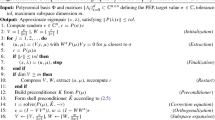Abstract
The Davidson method is a preconditioned eigenvalue technique aimed at computing a few of the extreme (i.e., leftmost or rightmost) eigenpairs of large sparse symmetric matrices. This paper describes a software package which implements a deflated and variable-block version of the Davidson method. Information on how to use the software is provided. Guidelines for its upgrading or for its incorporation into existing packages are also included. Various experiments are performed on an SGI Power Challenge and comparisons with ARPACK are reported.
Similar content being viewed by others
References
E. Anderson et al., LAPACK User's Guide (SIAM, Philadelphia, PA, 1992).
G. Cisneros and C.F. Bunge, An improved computer program for eigenvectors and eigenvalues of large configuration interaction matrices using the algorithm of Davidson, Comput. Chemistry 8(8) (1986) 157–160.
M. Crouzeix, B. Philippe and M. Sadkane, The Davidson method, SIAM J. Sci. Comput. 15(1) (1994) 62–76.
J.W. Daniel, W.B. Gragg, L. Kaufman and G.W. Stewart, Reorthogonalization and stable algorithms for updating the Gram–Schmidt QR factorization, Math. Comp. 30(136) (1976) 772–795.
E.R. Davidson, The iterative calculation of a few of the lowest eigenvalues and corresponding eigenvectors of large real-symmetric matrices, Comput. Phys. 17 (1975) 87–94.
I.S. Duff, R.G. Grimes and J.G. Lewis, Sparse matrix test problems, ACM Trans. Math. Software 15 (1989) 1–4.
G.H. Golub and C.F. Van Loan, Matrix Computations, 2nd ed. (Johns Hopkins University Press, Baltimore, MD, 1989).
A. Jennings and W.J. Stewart, A simultaneous iteration algorithm for real matrices, ACM Trans. Math. Software 7(2) (1981) 184–198.
M.T. Jones and P.E. Plassmann, An improved incomplete Cholesky factorization, ACM Trans. Math. Software 21(1) (1995) 6–17.
M.T. Jones and P.E. Plassmann, Algorithm 740: Fortran subroutines to compute improved incomplete Cholesky factorizations, ACM Trans. Math. Software 21(1) (1995) 18–19.
N. Kosugi, Modification of the Liu–Davidson method for obtaining one or simultaneously several eigensolutions of a large real-symmetric matrix, Comput. Phys. 55 (1984) 426–436.
R.B. Lehoucq, Analysis and implementation of an implicitly restarted Arnoldi iteration, Ph.D. thesis, Department of Computational and Applied Mathematics, Rice University (1995).
R.B. Lehoucq and J.A. Scott, An evaluation of software for computing eigenvalues of sparse nonsymmetric matrices, Technical Report MCS-P547-1195, Argonne National Lab. (1996).
R.B. Lehoucq, D.C. Sorensen and C. Yang, ARPACK Users' Guide: Solution of Large-Scale Eigenvalue Problems with Implicitly Restarted Arnoldi methods (SIAM, Philadephia, PA, 1998).
B. Liu, The simultaneous expansion for the solution of several of the lowest eigenvalues and corresponding eigenvectors of large real-symmetric matrices, in: Numerical Algorithms in Chemistry: Algebraic Method, eds. C. Moler and I. Shavitt (LBL-8158 Lawrence Berkeley Lab., 1978) pp. 49–53.
K. Meerbergen and M. Sadkane, Using Krylov approximations to the matrix exponential operator in Davidson's method, to appear in Appl. Numer. Math.
R.B. Morgan and D.S. Scott, Generalizations of Davidson's method for computing eigenvalues of sparse symmetric matrices, SIAM J. Sci. Statist. Comput. 7(3) (1986) 817–825.
Y. Saad, SPARSKIT: a basic tool kit for sparse matrix computation, version 2, Technical Report, Computer Science Department, University of Minnesota, Minneapolis, MN.
Y. Saad, Numerical Methods for Large Eigenvalue Problems, Algorithms and Architectures for Advanced Scientific Computing (Manchester University Press, Manchester, UK, 1992).
M. Sadkane, Block Arnoldi and Davidson methods for unsymmetric large eigenvalue problems, Numer. Math. 64 (1993) 195–211.
R.B. Sidje, EXPOKIT: Software package for computing matrix exponentials, ACM Trans. Math. Software 24(1) (1998) 130–156.
G.L.G. Sleijpen and H.A. Van der Vorst, A Jacobi–Davidson iteration method for linear eigenvalue problems, SIAM J. Matrix Anal. Appl. 17 (1996) 401–425.
D.C. Sorensen, Implicit application of polynomial filters in a k-step Arnoldi method, SIAM J. Matrix Anal. Appl. 13 (1992) 357–385.
A. Stathopoulos and C.F. Fischer, A Davidson program for finding a few selected extreme eigenpairs of a large, sparse, real, symmetric matrix, Comput. Phys. Comm. 79(2) (1994) 268–290.
J. Weber, R. Lacroix and G. Wanner, The eigenvalue problem in configuration interaction calculations: a computer program based on a new derivation of the algorithm of Davidson, Comput. Chemistry 4(2) (1980) 55–60.
Rights and permissions
About this article
Cite this article
Sadkane, M., Sidje, R.B. Implementation of a variable block Davidson method with deflation for solving large sparse eigenproblems. Numerical Algorithms 20, 217–240 (1999). https://doi.org/10.1023/A:1019199700323
Issue Date:
DOI: https://doi.org/10.1023/A:1019199700323




